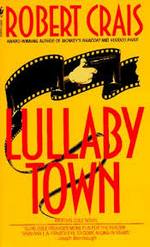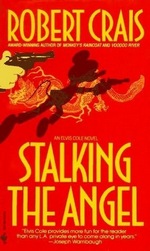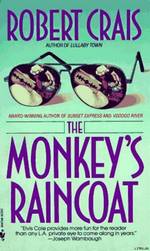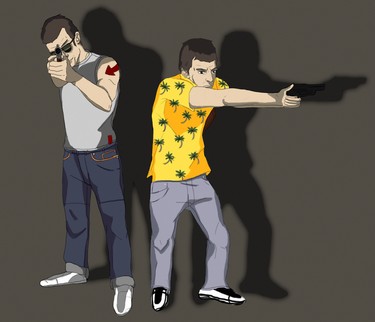I said I’d get this posted on Monday, not when on Monday. It’s amazing what a cold, a tweaked work schedule and a National Holiday can do to one’s writing schedule. Still, the way the last few days have gone to be only 12 hours late is pretty good.
—–
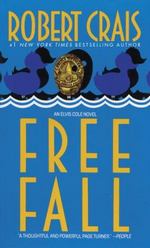 Free Fall
Free Fall
by Robert Crais
Series: Elvis Cole, #4
Mass Market Paperback, 288 pg.
Bantam Book, 1994
Read: August 27, 2014
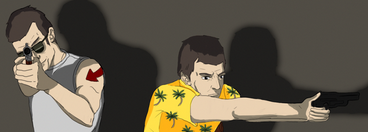
I’m sure others have said this, but after writing a character suspected of being a dirty cop (at the beginning of the novel — not saying what’s decided by the end) named Mark Thurman, what was Robert Crais’ reaction to Mark Fuhrman hitting the news a couple years later? You know no one at Bantam would’ve let him use that name if the timeline was a little different.
What’s this about a dirty cop? Sure, I should get to that — Elvis’ client this time is a damsel-adjacent-to-distress. Jennifer Sheridan is convinced something is wrong with her fiancé/childhood sweetheart. He’s a police officer attached to some special squad and she’s afraid that he’s being forced into doing something criminal (she’s also afraid that he’s not being forced at all, but she doesn’t admit that), and wants Elvis to get him out of the jam. She can’t afford to hire him, but she has a payment plan in mind. Elvis being Elvis (and not Joe Pike), he takes the case.
In so many hard-boiled P. I. novels, the initial meeting — the initial sighting — with the client is vital, and authors pour some of their best descriptive powers into that. Go read the first chapter or two of The Big Sleep, God Save the Child or The Judas Goat to confirm that, if you must (first three I thought of, I could be here all day if I tried to make this exhaustive). Crais puts more effort getting Chapter 1 of this book right than he does the rest of it (at least it seems that way to me, I don’t know, how do you measure creative effort anyhow?) — he makes sure the hook is set, and set thoroughly.
Jennifer Sheridan had sounded young on the phone, but in person she looked younger, with a fresh-scrubbed face and clear healthy skin and dark auburn hair. Pretty. The kind of happy, innocent pretty that starts deep inside, and doesn’t stop on the way out. That kind of pretty. She was wearing a light blue cotton skirt whit a white blouse and a matching light blue bolero jacket and low-heeled navy pumps. The clothes were neat and fit well, and the cuts were stylish but not expensive. She would have to shop and she would have to look for bargains, but she had found them. I liked that. She carried a black imitation leather purse the size of a Buick, and when she sat, she sat with her knees and her feet together, and her hands clutching the purse on her lap. Proper. I liked that, too. I made her for twenty-three but she looked eighteen and she’d still be carded in bars when she was thirty.”
In one paragraph, you know exactly how she looks, you know her personality, her financial state, have an idea of her background, and the kind of job she has. We like this girl, we want Elvis to help her already. And not in a Dan Brown-ish, reading off a résumé kind of way, either. But in a way youwant to keep reading. “The kind of happy, innocent pretty that starts deep inside, and doesn’t stop on the way out. That kind of pretty.” Some authors would be happy to call it a career if they pulled off that line. A page later we read:
She glanced into the big purse as if there were something inside it that she was hoping she wouldn’t have to show me, as if the purse were somehow a point of no return, and if she opened it and let out whatever was inside, she would never be able to close it again or return the elements of her life to a comfortable or familiar order. Pandora’s Purse. Maybe if I had a purse like that, I’d be careful of it, too.
Here, over one page we know this client, how bad her situation is, and what’s at stake for her — sure, not the details, but no need to sweat those. If the rest of the book matched this chapter, we’d be in for a real treat.
It’s not as vital — but this is the first time that Elvis has met a prospective client alone. It sets up a different dynamic from the get go. Also, we don’t get the “I’m not doing this for you, but for him/her” thing. It’s a book of firsts, folks. Well, we don’t get it in the first chapter, anyway.
Immediately, her fiancé, Marc Thurman and his drunk partner Floyd Riggens come into his office to strong-arm him away from taking the case, feeding him what’s clearly a line. This doesn’t deter Elvis, but it does give him plenty to think about.
His investigation gives some quick answers, which seem to satisfy him, but not his client. After he tries to tell her she’s wrong about her suspicious, she convinces him to carry on. Neither feel very good about the way that meeting went.
I gave Jennifer Sheridan a lift the three blocks back to her office and then I headed back toward mine, but I wasn’t particularly happy about it. I felt the way you feel after you’ve given money to a panhandler because the panhandler has just dealt you a sob story that both of you knew was a lie but you went for it anyway. I frowned a lot and stared down a guy driving an ice cream truck just so I could feel tough. If a dog had run out in front of me I probably would’ve swerved to hit it. Well, maybe not. There’s just so much sulking you can do.
(I just really liked that paragraph) So Elvis carries on, and soon uncovers some criminal activity (which is why it’s not a 50 page book) — though there’s some question about how involved Thurman is. As he peels back layer after layer, things look worse and worse. It doesn’t take long until Elvis gets a look at what can go wrong in an organization like the LAPD, even as it tries to recover from the Rodney King incident and the ensuing riots.
The problem with this one for me is this Giant Criminal Act (henceforth: GCA) that Joe and Elvis perpetrate. It’s difficult to discuss without spoiling anything. And yes, I see where it looked like they had no choice, and how the rest of the novel is really only possible resulting from it. But we’re not talking about something like Elvis committing a little B&E to snoop for clues, or like when they invade a mobster’s home to rescue a kidnap victim and kill some criminals. Tropes of the genre, and to one extent or another, justifiable. This is a clear-cut felony, no ifs, ands or buts about it. I have trouble with that. Their decision to commit the GCA was too quick and too casual. Five words of dialogue. Five. That’s it. And then to actually perpetrate the GCA? Piece of cake. Elvis has had harder times getting a sandwich from the deli below his office. Speaking of easy — having committed the crime, it’s super-easy to evade the police afterwards. And it’s a big enough happening that there should’ve been plenty of media coverage to make it difficult for the two of them to do anything. Yet, the next 80 pages go by without any real difficulty at all for them (at least from the GCA). Other than a little tension between Elvis and Poitras for a minute, there’s no fall-out, either. From conception to carrying out to fall out, it’s all too easy. And it shouldn’t be. Not in the world that Crais has made — there should be consequences.
Still, if you swallow that pill, suspend enough disbelief, or just delay thinking about it — what follows is rocking good ride. Lots of action, some good characters, Elvis’ own reminder about how different L.A. can be depending on the color of your skin and what part of town that you’re in. Between the GCA and the final shoot-out, this one felt more like a pretty good action movie than a decent P. I. novel — the kind that Peter Alan Nelson would direct. That’s not necessarily a knock, but it’s sure not a compliment.
I’m also troubled at the initial confrontation between Elvis and Thurman & Riggens. If that had been pushed back just a little, until Elvis had started the investigation, even by just a couple of hours, it would’ve worked better. Instead, while her recently vacated seat is still warm, they come in hot. I had a hard time buying it — it’s too much, too fast. It felt like Crais was trying to raise the tension prematurely. Sure, it can be a sign that Thurman and Riggens are stressed-out cops on the verge of a breakdown and are therefore acting stupidly and recklessly. But in the moment, it just seems misplayed. Let Elvis make a call or two, ask a question of someone. Let him actually do something before you react.
Quick continuity check-in: Eddie Ditko, Elvis’ friend from the newspaper is back, and is good for some background on Thurman and his team. Lou Poitras gets consulted a bit early on, and along with giving Elvis a nudge in the right direction, reminds him that he owes him some money. I love that when Lou Poitras reminds Elvis that he owes him money, it’s always for a paltry sum — $5, $12. Elvis is quite the high roller. Cindy, who we almost met in the last book is briefly mentioned, Elvis is going to have to introduce us to her soon if he’s going to keep talking about her. Lastly, Ellen Lang gets name-dropped, and is good for some insight into Joe Pike.
Speaking of Joe Pike — I really haven’t talked about his contribution to this novel. As it involved LAPD officers, you know it’s going to get interesting once he gets involved. Turns out, that Joe rode for awhile with Thurman’s squad leader, and his reaction doesn’t seem to be the insta-hatred that everyone else on the force feels for Joe. But there’s a lot of interaction with the LAPD beyond the REACT team later on — and everyone is ready to express their disdain for Pike. Still, not really given any answers why. Until this trip through the series, I didn’t notice a. how often this was brought up, and b. how much Crais strings us along before giving us answers. Reading it in such a compressed time really helps.
The strenghts of this are in the — the not-as-nice corners of L. A., in the shadow of the riots — there’s bleakness, despair, and some sort of hope. Mostly, the strength of the book comes from some of the characters we meet for the first time: Rusty Swetaggen, Elvis’ former client, seems like a nice guy, a good reminder that sometimes Elvis has cases that don’t end in gunfights. Ida Leigh Washington, a mother of a murdered son that we meet early on, she’s got some strong character and backbone. Her other son, James Edward, is a nice, kid who’s trying to do something with his life post-Navy, it’s a shame he has to come back to this part of L. A. But at least, he gets to reconnect with Ray Depente, an ex-Marine, who works with little kids, people who get tangled up in gangs that shouldn’t, and pays the bills by teaching action stars how to throw a punch (no idea if he knows Nelson or not). I’d read a book or two about Depente.
Lastly, does anyone know if Depente is based on a real person? If so, it’d be really interesting to read more about him. Same goes for Rollie George from Lullaby Town. Both feel like they just might be based on someone in the real world.
In the end the GCA ruins my appreciation for this one. I get Crais’ thinking on that one. I think I do, anyway. But its minuses far outweigh the pluses. There are interesting moments in this book, some fun things. But if not for the GCA, it’d be roughly on the level of Stalking the Angel for me. Good character moments, decent enough plot, good action, intriguing twist on what’s expected from the initial conversation with the client, etc. But oh, well. Everyone deserves an “off” day/book. And — Voodoo River‘s next, starting off a run of my three favorites in the series (at least I recall that being the case, we’ll see how good my memory is).
What about you? Did you mind the GCA (spoil away in the comments section — at least spoil this book)? Am I being too hard on this entry?
—–

—–
Drawing by Kirsty Stewart, chameleonkirsty on deviantART, used with permission.


